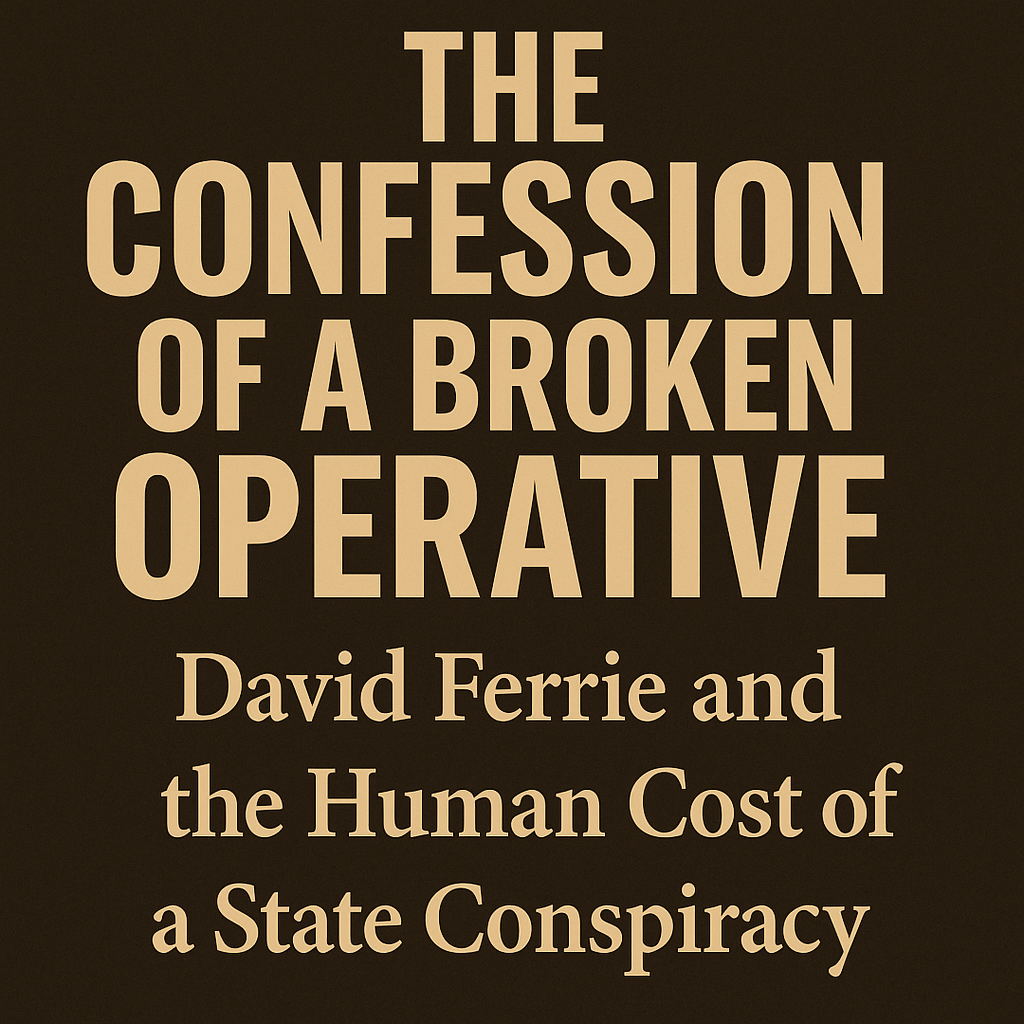Subtitle: How Blackmail, Betrayal, and a Secret War Machine Destroyed a Man—and Revealed the Truth Behind the JFK Assassination
Introduction: The Face of a Crumbling Empire
There’s a moment in Oliver Stone’s JFK (1991) that doesn’t rely on documents, strategy, or ideology—it relies on pain.
That moment comes from David Ferrie, portrayed as a compromised, deteriorating former pilot and CIA asset, whose tortured monologue exposes the raw human damage caused by a conspiracy too large to fully grasp.
While Ferrie is based on a real person, his monologue serves as a window into the soul of America’s shadow government—where loyalty is leveraged, faith is discarded, and truth is buried under layers of plausible deniability.
1. Lost Trust and Emotional Collapse
“I guess I just don’t know trust anymore.”
Ferrie is unraveling. The pressure of secrets, betrayal, and sickness has shattered his emotional foundation. He no longer trusts people, institutions, or even himself. The system he served has discarded him—and he knows it.
2. Caught Between Knowledge and Silence
Though he knows the system intimately, Ferrie refuses to officially “cooperate.” He has information—but no protection. Speaking could destroy him, but silence is tearing him apart.
“Don’t be writing this down. I ain’t cooperating here with no one.”
3. Blackmailed into Obedience
Ferrie reveals that he’s been controlled through sexual blackmail—photographs, threats, and leverage. His sexual identity, in the hands of intelligence handlers, became a lifelong chain.
“He got me by the balls… Compromised.”
4. Ferrie Trained Oswald—And Knew His Role
Ferrie confirms Oswald trained under him in the Civil Air Patrol—a documented fact.
He paints Oswald as awkward, disliked, suspected of being a snitch. Yet Ferrie mentored him, implying a deeper connection than the public was ever told.
5. Oswald Was Always an Asset
Oswald’s role was not random. He was inserted, controlled, manipulated.
His presence in New Orleans, Mexico City, and Dallas aligns with classic intelligence patterns. Ferrie’s link to him strengthens the theory that Oswald was a low-level intelligence tool, not a lone killer.
6. Terminal Illness and Despair
Ferrie has cancer. He’s dying. That looming fate accelerates his breakdown—and his yearning to unburden his conscience.
“I got cancer… I’ve had it for years.”
7. “You Don’t Leave the Agency”
“You make it sound like some remote fucking experience… You don’t leave the agency. It’s for life.”
This line is critical. Ferrie shatters the illusion that intelligence operatives have freedom.
Once you’re in, you’re owned—for life. Even without a badge or paycheck, the leash never comes off.
8. Clay Shaw and “Walter” – Untouchable Agents
Ferrie names Clay Shaw—on trial in Garrison’s case—as a key player with “highest clearance.”
He also mentions a “Walter,” another high-ranking spook.
Shaw wasn’t some businessman—he was deep inside the national security state.
9. Jack Ruby: Bagman, Gunrunner, Double Agent
“Jack was a pimp… bag man for the Dallas mob… ran guns to Castro… played both sides.”
Ruby’s role was larger than killing Oswald. He was a conduit between the mob, intelligence, and Cuba—a multi-directional asset who flipped as needed.
10. CIA and Mafia Were Collaborating
“CIA and the mob were working together… mutual interest.”
Ferrie confirms what others only implied: the Mafia and CIA were allies, especially in the anti-Castro front. The line between government and organized crime blurred completely.
11. Operation Mongoose Was the Nexus
He references Operation Mongoose, a real Pentagon-backed CIA black op against Cuba:
- Sabotage
- Infiltration
- Assassinations
- Money laundering via fake companies
This was the blueprint for domestic black ops. Eventually, the tools created for foreign enemies were turned inward—against Kennedy.
12. Nobody Knows Who’s Really in Charge
Ferrie screams in frustration about the web of secrecy.
“Who the fuck pulls whose chain? Who the fuck knows?”
Even insiders don’t know who’s calling the shots. This is compartmentalization by design—to insulate those at the top and keep operatives in the dark.
13. The Conspiracy Is Too Big to Grasp
“It’s a mystery wrapped in a riddle inside an enigma.”
This now-famous line captures the deliberate confusion that protects elite crime.
So many moving parts, layers of fiction, and lack of clear evidence that even the shooters don’t fully understand the whole picture.
14. Lost Purpose and Shattered Faith
Ferrie’s final outburst is haunting:
“All I ever wanted was to be a Catholic priest… live in a monastery… pray to God.”
But he failed. His one weakness led to blackmail, betrayal, and moral ruin. He’s a man who sold his soul and can’t buy it back.
15. “They’ll Destroy You Too”
“They’ll destroy you. Let me touch you.”
Ferrie warns Garrison: You’re now a threat.
If you get close to the truth, they won’t just kill you—they’ll first destroy your reputation, isolate you, ruin your life.
16. Ferrie Is Slipping—And Time Is Running Out
As the scene ends, Garrison’s team realizes Ferrie is collapsing.
He is a decaying witness to a rotting empire. The system chewed him up, and now he’s a liability. If they don’t act soon, he’ll either die or be silenced.
Conclusion: The Confession of a Wounded Machine Part
David Ferrie wasn’t the mastermind.
He wasn’t even a primary planner.
He was a middle-tier component in a monstrous machine—a human being who carried secrets too dark for a single soul.
His confession is less about facts and more about what it feels like to be used by empire:
- Blackmailed for loyalty.
- Abandoned after usefulness.
- Haunted by the truth.
- Destroyed by silence.
Ferrie died shortly after the real-life Garrison investigation began. Officially, it was natural causes.
But JFK asks us to look again—and to hear the cry beneath the chaos.
“Who did this is too fucking big for you… even the shooters don’t know.”
This wasn’t a lone nut. It wasn’t an accident.
It was a machine.
And Ferrie’s cracked voice gives us a glimpse at the cost of being a cog in it.
Below is a point-by-point breakdown of the second major monologue from the film JFK (1991), this time focusing on David Ferrie—a volatile, desperate, compromised figure in the CIA-mob-Cuban web—breaking down emotionally under pressure from guilt, fear, and deteriorating health.
This scene gives a raw glimpse into:
- The emotional toll on covert operatives,
- The use of blackmail by intelligence agencies,
- The fusion of organized crime and government,
- And the terrifying depth of the conspiracy.
Inside the Breakdown: A 16-Point Analysis of the David Ferrie Monologue in JFK (1991)
Subtitle: Fear, Guilt, and the Web of the Deep State
By Liberty Advocate
1. Trust Is Gone: Ferrie Is Spiraling
“I guess I just don’t know trust anymore, you know?”
David Ferrie opens by revealing his internal collapse. He’s paranoid, disoriented, and visibly unraveling. His faith in institutions, friends, and reality has disintegrated—highlighting the corrosive effect of working inside the intelligence underworld.
2. He Still Wants to Help—but Can’t Officially Cooperate
“Don’t be writing this down. I ain’t cooperating here with no one.”
Ferrie hints that he knows a lot, but refuses to “go on the record.” He’s caught between knowing too much and fearing what would happen if he spoke up.
3. He’s Been Compromised and Blackmailed
“Sharpie cock-sucking faggot… got me by the balls. Photographs. Compromised.”
Ferrie was blackmailed over his sexual identity—a common tactic used by intelligence services to control assets. His entrapment is part of how the CIA kept operatives obedient.
4. He Knew Oswald Personally
“I knew Oswald. He was in my Civil Air Patrol unit.”
Ferrie confirms a documented link to Lee Harvey Oswald, implying he mentored him.
This supports broader claims that Oswald was not a “lone nut,” but a known player in intelligence circles.
5. Oswald Was Disliked, Suspected as a Snitch
“Nobody really liked him… thought he was a snitch.”
Oswald was viewed with suspicion by insiders, yet Ferrie says he treated him well—implying a protective or supervisory relationship.
6. Ferrie’s Dying—and Feels Abandoned
“I got cancer… been flashing on, trying to find a cure.”
Ferrie’s despair is intensified by his terminal illness. He knows the agency has discarded him, despite his past loyalty and service.
7. “You Don’t Leave the Agency”
“You make it sound like some remote fucking experience… You don’t leave the agency. It’s for life.”
This is a direct statement about how CIA operatives remain bound to the agency forever, even if unofficially. It’s not a job—it’s an invisible chain.
8. He Names Clay Shaw and “Walter” as Key Figures
“Shaw… highest clearance. Walter. Cubans. All agency.”
He names Clay Shaw (on trial) and “Walter” as top-level intelligence figures connected to the plot, implying Shaw’s immunity came from deep ties.
9. Jack Ruby Was an Agency-Mob Bagman
“Jack was a pimp… bag man for the Dallas mob… ran guns to Castro… played both sides.”
Ruby, who killed Oswald, is framed not as a random nightclub owner, but as a middleman between mob and CIA, further undermining the lone gunman theory.
10. The CIA and Mob Worked Together
“CIA and the mob, they were working together. Mutual interest.”
Ferrie states it plainly: organized crime and U.S. intelligence cooperated, especially in anti-Castro operations. They shared assets, funding, and targets.
11. Operation Mongoose Mentioned
“Check out something called Mongoose… Pentagon stuff.”
He mentions Operation Mongoose, a real, CIA-led program to assassinate Fidel Castro and sabotage Cuba—funded by the Pentagon, run out of Miami.
12. No One Knows Who’s Really in Charge
“Who the fuck pulls whose chain? Who knows?”
Ferrie captures the labyrinthine nature of black ops. Everyone is following orders—but the origin of those orders is unclear, even to insiders.
13. The Assassination Was Too Big to Comprehend
“Who killed the President? Man, it’s a mystery… wrapped in a riddle… inside an enigma.”
Ferrie essentially says: The scale of the plot is so vast, even participants don’t fully understand it. A poetic admission of being trapped in a machine.
14. Guilt and Lost Purpose
“All I ever wanted was to be a Catholic priest. To live in a monastery. Pray to God.”
Ferrie mourns what he could have been—highlighting how blackmail and compromise destroyed his spiritual ambitions, leading him into a life of shadows.
15. “They’ll Destroy You Too”
“They’ll destroy you. Let me touch you.”
Ferrie warns Garrison: just investigating the truth makes you a target. The system doesn’t tolerate dissent. It doesn’t kill you immediately—it first destroys your credibility.
16. Even Ferrie’s Friends See He’s Unraveling
“He’s changing what he says… We can’t protect him. We need more men.”
Garrison’s team realizes that Ferrie is both their best witness and a collapsing man. Time is running out before he recants, breaks down, or dies.
Summary: Ferrie as a Microcosm of a Broken System
David Ferrie isn’t just a minor character in a conspiracy—he’s a symbol of what happens to insiders who get used, blackmailed, and discarded by systems they once served.
Through his desperate monologue, we learn that:
- Oswald was connected to intelligence and likely managed.
- Clay Shaw and Jack Ruby were not rogue actors—but participants in a network of criminal-corporate-state collusion.
- The CIA and Mafia were joint partners in covert operations.
- The truth is so deep and complex, even the players don’t fully grasp it.
- The cost of speaking up is isolation, discrediting, or death.
In short: David Ferrie is what a conscience looks like when it’s eaten alive by secrecy, shame, and silence.






